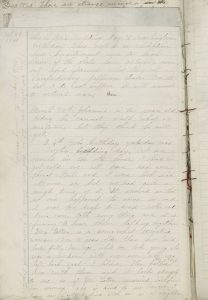 The Civil War was a time of conflict and distress. While we often hear stories of the courageous men who fought the bloody battles of a terrible and long war, the battles did not stop on the fields. Citizens from all states and backgrounds gathered strength and stepped into positions they never thought possible, including Betsey Jennings Nixon, who discovered fresh reserves of strength as the war progressed.
The Civil War was a time of conflict and distress. While we often hear stories of the courageous men who fought the bloody battles of a terrible and long war, the battles did not stop on the fields. Citizens from all states and backgrounds gathered strength and stepped into positions they never thought possible, including Betsey Jennings Nixon, who discovered fresh reserves of strength as the war progressed.
The NEHGS Library holds the diary of Betsey Jennings Nixon in its R. Stanton Avery Special Collections. The diary has been digitized and is available on the American Ancestors Digital Collections website. Betsey, the daughter of William and Louise (Sheldon) Nixon, was born in 1839 and grew up in Ohio, living in several neighboring states before eventually moving to Colorado where her sons had settled.
Betsey’s entries begin in 1853 with the trials and tribulations of a young girl caught in the judgmental gaze of an expectant society. At that time, Betsey’s worries are limited to her school and the attentions of various suitors. Betsey views her life as if it is a Jane Eyre novel, oftentimes actually mentioning the relationship of Rochester and Jane. As she enters her seventeenth year, Betsey finally decides it is time to settle down with the childhood friend who has always loved her and whom she realizes she has always loved as well.
...Betsey often mentions her support for Abraham Lincoln and writes of her excitement when he is elected as president.
While the diary begins with a bit of girlish naiveté, as the Civil War commences Betsey writes of serious matters. As Ohio is a northern state, and therefore a supporter of the Union, Betsey often mentions her support for Abraham Lincoln and writes of her excitement when he is elected as president. The diary describes the rising conflict between the north and the south, and yet there remains a glimmer of hope that the war will quickly end in the first few months of 1861.
Betsey and her friends and family possessed businesses outside of Ohio and were constantly traveling between Pennsylvania, the Virginias, and New Orleans. While she was in New Orleans in April 1861, the city became full of armed militia and any person from the northern states was forbidden to leave the city. While Betsey had a difficult time getting out of the state and back home, her brother Zeb – a known Yankee and Republican – faced even more obstacles. When Zeb finally found a way home, he immediately enlisted in the 36th Ohio Regiment.
With all the men gone and her husband sick, Betsey found herself reduced to her very last dollar and therefore wrote to the Governor of Ohio, John Brough. She asked not only that landless wives get a bounty, but that because there is no “able bodied man left in this Precinct to till the ground of those who have [farms],” all wives should receive a bounty. The letter that Betsey received from Governor Brough is included in the collection of diary entries and contains his response, in which he states that he has issued an order to the officers that they will all now receive a bounty.
Resolved to make her own money, Betsey began planting crops, maintaining the fields, and writing for the Cincinnati Gazette. As all this work unfolded, Betsey realized how strange it was for a woman to be doing the outdoor work and a man, her husband, to be doing the cooking. She also realized how she is “different from the other women… When they get together, they are all crying bitterly, but my eyes are dry as dust.” Betsey is strong, persistent, and ahead of her time in many aspects of life, as she does not allow herself to waste away during these trying times. Betsey even admits later in her diary that there are times when she wishes she were a man, as she does not see herself as a “normal” woman.
She also realized how she is “different from the other women… When they get together, they are all crying bitterly, but my eyes are dry as dust.”
Betsey’s diary is a firsthand look into the life of a woman during the time of the Civil War – a perspective that is not always represented. While reading Betsey’s entries, I realized that although the work of women during the twentieth-century World Wars is celebrated, there is nothing comparable on the accomplishments and willpower of the nineteenth-century women like Betsey who created a stable life for themselves. Betsey as an individual is remarkable, as she did nothing in life for her own self-interest; instead, she “did it for the good of all the suffering women … for those who are worse off than [herself].”
Source
Diary of Betsey Jennings Nixon, 1853-1866, Mss C 5837, R. Stanton Avery Special Collections, New England Historic Genealogical Society, online at DigitalCollections.AmericanAncestors.org. Transcription begins on p. 117.
Note
See other Civil War manuscripts from the NEHGS Library in the American Ancestors Digital Collections.
Share this:

About Lydia Cheever
Lydia Cheever is an intern at the NEHGS Library. She is a student at Marist College, where her major is history education. Lydia plans to become a high-school history teacher. She is interested in all things historical, particularly the period of World War II.View all posts by Lydia Cheever →